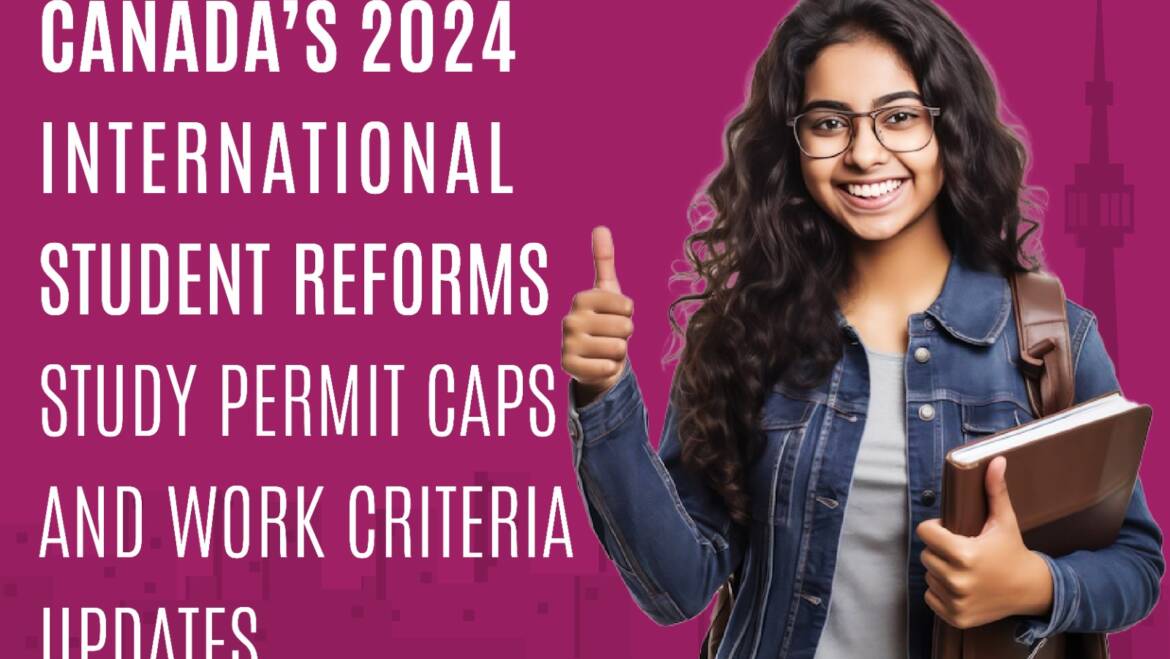Canada’s 2024 International Student Reforms – Study Permit Caps and work eligiblity Criteria Updates
Date: January 22, 2024
Introduction
Welcome to an exploration of transformative changes shaping international education in Canada. In this blog, we delve into the “Canada 2024 Student Reforms,” highlighting pivotal developments. These include study permit caps, ineligible education institutions, eligibility for the Post-Graduation Work Permit (PGWP), and eligibility for Spousal Open Work permits for the spouses of international students.
Canada’s Response to Challenges
Renowned for its diverse society, Canada addresses challenges in its international student system with significant reforms. The Honourable Marc Miller, Minister of Immigration, Refugees, and Citizenship, recently unveiled measures to stabilize international student growth, safeguard essential services, and foster sustainable population growth.
Addressing Challenges and Ensuring Stability
Recent financial exploitation within the international student system has prompted decisive action from the Canadian government. The influx of students lacking adequate support systems has strained housing, healthcare, and essential services. In response to these challenges, measures are now being implemented to protect international students and ensure sustainable growth.
The Canada 2024 Student Reforms signify a strategic approach by the government to ensure sustainable growth and safeguard essential services. These reforms, particularly the introduction of study permit caps and updates to work criteria, aim to create a more balanced and supportive environment for international students.
Study Permit Caps for 2024
Provincial Allocation and Attestation Letters
Immigration, Refugees, and Citizenship Canada (IRCC) will allocate permits to each province and territory. Provinces will then distribute them among their designated learning institutions. Starting January 22, 2024, study permit applications submitted to IRCC will necessitate an attestation letter from the respective province or territory. The process is expected to be established by March 31, 2024.
These temporary measures will remain in effect for two years, subject to reassessment at the end of 2025.
Aligning Post-Graduation Work Permit Program Criteria
Adjustments to the Post-Graduation Work Permit Program criteria are set to commence on September 1, 2024. However, international students enrolled in study programs under curriculum licensing arrangements won’t be eligible. On the other hand, graduates of master’s and other short graduate-level programs will now qualify for a 3-year work permit.
The Canada 2024 Student Reforms mark the beginning of a new era for global learners in the country. By closely examining the nuances of these reforms, we gain valuable insights into the measures taken to foster a robust and inclusive framework for international education in Canada.
Changes to Open Work Permits for Spouses
Open work permits will soon be exclusive to spouses of international students in master’s and doctoral programs, excluding spouses of students in other study levels.
Minister Marc Miller’s Perspective
According to Minister Marc Miller, “International students are vital to Canada, and we must ensure they have access to resources for an enriching academic experience. Through decisive measures, we’re striking the right balance for Canada and setting students up for success.”
Looking Ahead: Pathways to Permanent Residence and Reforms
The Canadian government remains committed to providing pathways to permanent residence for students with in-demand skills. Ongoing collaborations aim to shape a more robust and inclusive framework for international students in Canada, with targeted pilots to support underrepresented cohorts in 2024.
As Canada 2024 Student Reforms shape a new narrative for global learners, ongoing collaboration will continue to shape a more inclusive framework for international students in Canada.


Add Comment